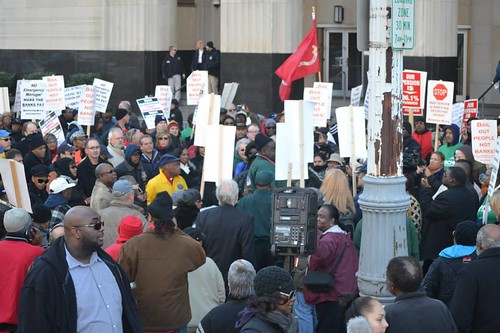
People in Detroit took over the streets in front of the federal courthouse demanding an end to the state-imposed bankruptcy of the city. "Make the Banks Pay" they chanted., a photo by Pan-African News Wire File Photos on Flickr.
City bankruptcy one of many attacks on Detroiters
By Cheryl LaBash on January 9, 2014
Workers World
Jan. 5 — The new year began with the swearing in of Detroit’s first white mayor in 40 years and a city council elected in geographical districts. What is notable about Mayor Mike Duggan is how quickly he came to a working agreement with Kevyn Orr, the city’s appointed emergency manager, and how thoroughly and openly his write-in campaign was financed and engineered by the wealthy, who hope to retake and remake Detroit and erase its militant, working-class history.
While the Detroit municipal bankruptcy case continues in court, the EM’s plan for bankers’ restructuring is expected to be revealed soon. But even before Orr was appointed EM by Michigan’s reactionary Republican governor, Rick Snyder, elected city officials raced to avoid formal bankruptcy by carrying out the same program that the bankruptcy court is now being asked to accelerate.
Here are some examples of this looting of Detroit by privatization and other means that have already occurred:
• Trash and recycling collections have been contracted out as of March 1. Current drivers are required to reapply for their jobs.
• The landmark island park, Belle Isle, a traditional venue for family reunions, summer picnics and community gatherings, is now under state authority and an $11 annual auto fee is required.
• Birth and death recording and certificate sales were transferred to Wayne County. This revenue-generating function is the last part of the Detroit Health Department to be privatized. The only direct City of Detroit employees remaining are the public health director, deputy director and medical director, positions required for Detroit to maintain its legal public health authority.
• The Detroit convention center — Cobo Hall — was turned over to an authority, after corporate auto giants threatened to move the North American International Auto Show from the venue.
•The Public Lighting Department was morphed into the Public Lighting Authority so that part of Detroit’s unique “utility tax” could be used as collateral for yet more bonds to revitalize street lights.
Deals are being discussed to protect the Detroit Institute of Arts by removing it from city ownership. The disposition of the Detroit Water and Sewerage Department, which provides clean water and sewage treatment for all of southeastern Michigan, is being decided in mediation far from Detroit, at the New York law offices of Jones Day. The cost of this vital service is expected to rise.
The ‘emergency manager’ strategy
The now infamous “swap” agreements were foisted on elected officials in Detroit and around the country by Wall Street predators. This paved the way for the emergency manager and the bankruptcy court to remove any semblance of bourgeois democracy through a direct, imposed financial dictatorship on the city.
The jobs of 5,600 workers — virtually everything except police and firefighters — will be eliminated from the public workforce according to union sources. City contributions to the pension funds for those workers will no longer be required.
An earlier takeover of Detroit Public Schools honed the “emergency manager” strategy. When an ongoing struggle of nearly a decade finally won the right for an elected school board, the state appointees had squandered $1.5 billion in school construction bonds used in facilities that were closed, torn down or given away. Yet another appointed EM continued closing schools — most notoriously schools for deaf children and Oakman School. These schools had special facilities to serve children with disabilities while incorporating them within general education, to the enrichment of all.
During the 1990s through the early years of the 21st century, strong mobilizations by workers and community members blocked piecemeal moves to privatize various city services, including the water department. Officials elected by this majority African-American working-class city, even though constrained by working within the capitalist system, responded to protests and even enacted an anti-privatization ordinance.
Racist “downsizing” by the corporations in the 1970s and 1980s stripped away jobs, closing virtually dozens of auto and auto-related assembly and stamping plants, parts suppliers and small businesses that served tens of thousands of workers and their dependents. Only two highly automated assembly facilities remain in Detroit.
The now notorious big banks concocted a method to separate loan initiation fees from the ability to repay mortgages. Racist redlining practices by the banks had denied credit to the African-American people of the city and now predatory lenders opened the cash spigot to a credit-starved population.
This was the subprime mortgage crisis that disproportionately targeted people of color and women in Detroit and throughout the U.S.
No comments:
Post a Comment